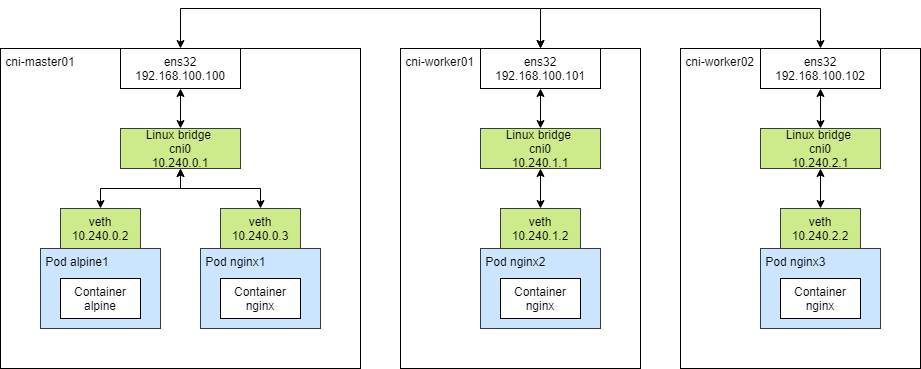Ansible playbook written for easy distribution of cni-from-scratch's my-cni-demo.
Please note that this only works for ubuntu distribution.
This will soon support RHEL/CentOS distribution.
- All of the steps below have been executed with
rootprivileges. - Ensure the environment which no other CNI is installed, that is, just after executing only
kubeadm initandkubeadm join. - Check hostnames and addresses of all nodes in your cluster. For example, there are 3 nodes - 1 master, 2 workers.
It is recommended that node running ansible can access others without a password.
For example, you can do it in the following ways:
# gen ssh pub key
ssh-keygen -q -N ""
# copy pub key to all hosts (including ansible host itself)
for host in cni-master01 cni-worker01 cni-worker02; do ssh-copy-id $host; done
All nodes require ansible package to be installed. The remaining dependent packages are installed using ansible.
apt install -y ansible
These files were written for my test environment, so you need to rewrite it for your environment.
[all]
cni-master01
cni-worker01
cni-worker02
Add all hostnames in your cluster here.
name: my-cni-demo
podcidr: 10.240.0.0/16
interface: ens32
bridge: cni0
nodeinfo:
- name: cni-master01
ip: 192.168.100.100
podcidr: 10.240.0.0/24
- name: cni-worker01
ip: 192.168.100.101
podcidr: 10.240.1.0/24
- name: cni-worker02
ip: 192.168.100.102
podcidr: 10.240.2.0/24
- name: Name of CNI binary
- podcidr: Pod network CIDR for your cluster when
kubeadm init --pod-network-cidr <CIDR> - interface: Host network interface for internet (ex. ethX, enpXXX, ensXX)
- bridge: Virtual bridge name for container network
- nodeinfo:
- name: hostname
- ip: ip address
- podcidr: Pod network CIDR for each node. Each node obtains IP CIDR for its own IPAM. (ex. /24 -> 254 pods per node)
ansible-playbook deploy.yaml
➜ cat << EOF | kubectl apply -f -
apiVersion: v1
kind: Pod
metadata:
name: alpine1
spec:
containers:
- name: alpine
image: alpine
command:
- "/bin/ash"
- "-c"
- "sleep 2000"
nodeSelector:
kubernetes.io/hostname: cni-master01
---
apiVersion: v1
kind: Pod
metadata:
name: nginx1
spec:
containers:
- name: nginx
image: nginx
nodeSelector:
kubernetes.io/hostname: cni-master01
---
apiVersion: v1
kind: Pod
metadata:
name: nginx2
spec:
containers:
- name: nginx
image: nginx
nodeSelector:
kubernetes.io/hostname: cni-worker01
---
apiVersion: v1
kind: Pod
metadata:
name: nginx3
spec:
containers:
- name: nginx
image: nginx
nodeSelector:
kubernetes.io/hostname: cni-worker02
---
EOF
pod/alpine1 created
pod/nginx1 created
pod/nginx2 created
pod/nginx3 created
➜ kubectl get po -o wide
NAME READY STATUS RESTARTS AGE IP NODE NOMINATED NODE READINESS GATES
alpine1 1/1 Running 4 21h 10.240.0.6 cni-master01 <none> <none>
nginx1 1/1 Running 0 21h 10.240.0.7 cni-master01 <none> <none>
nginx2 1/1 Running 0 21h 10.240.1.2 cni-worker01 <none> <none>
nginx3 1/1 Running 0 17h 10.240.2.2 cni-worker02 <none> <none>
➜ kubectl exec -it nginx1 -- sh -c "echo nginx1 > /usr/share/nginx/html/index.html"
➜ kubectl exec -it nginx2 -- sh -c "echo nginx2 > /usr/share/nginx/html/index.html
➜ kubectl exec -it nginx3 -- sh -c "echo nginx3 > /usr/share/nginx/html/index.html"
➜ kubectl exec alpine1 -- wget -qO- 10.240.0.7
nginx1
➜ kubectl exec alpine1 -- wget -qO- 10.240.1.2
nginx2
➜ kubectl exec alpine1 -- wget -qO- 10.240.2.2
nginx3
Thanks to @eranyanay. His CNI is very intuitive and will be a very good guide for anyone who wants to start developing CNI.
